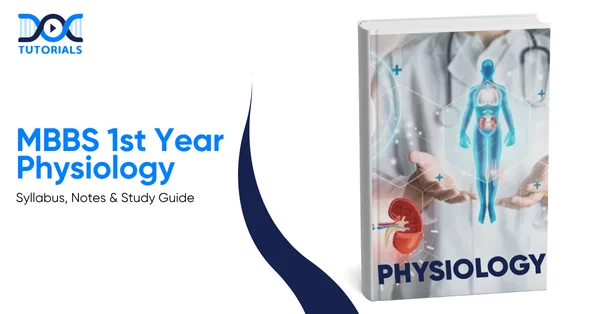MBBS 1st Year Physiology: Syllabus, Notes & Study Guide

Physiology is the science of the normal functioning of the body, both in terms of cells, tissues, and organs, or the entire body. The first year MBBS course of physiology presents the basis upon which we learn how our body functions when healthy or when in disease. Physiology is usually used in combination with anatomy and biochemistry as preclinical medicine subjects.
The ultimate aim is to provide students with a comprehensive understanding of organ systems and physiological concepts so that they can use them in clinical practice in the future. The main concepts taught to first-year students are homeostasis, feedback systems, and cell transportation, together with system-specific processes (cardiovascular, respiratory, endocrine, etc.).
Exposure to physiology also aids in other subjects, such as pathology and pharmacology, in the future. Studying first-year physiology thoroughly in MBBS is essential, as it explains how the body functions and helps one understand the nature of illnesses.
Read further to gain a thorough interpretation.
Course Structure and Exam Pattern for Physiology MBBS 1st Year
In MBBS 1st year, physiology is usually covered within two semesters and is made up of both theory and practical parts. Students typically face two written theory papers (100 marks each) and one practical/viva exam (100 marks) at the end of the year.
The theory examinations consist of short- and long-answer questions and problems that are based on cases. Textbooks are comprehensive and well-developed for first-year MBBS syllabuses. In addition to lectures, students typically use concise summary notes and coaching materials to prepare.
- Exam Format: 2 theory papers (100 marks each) and a practical and viva (100 marks)
- Syllabus Coverage: The curriculum involves general physiology (homeostasis, membranes), haematology (blood), neuro-muscular, cardiovascular, respiratory, gastrointestinal, renal, endocrine, and special senses
- Standard References: Well-renowned physiology textbooks are a guarantee of full subject coverage.
Physiology MBBS 1st Year: Key Topics & Syllabus Breakdown
Each central system has significant topics in the MBBS 1st year physiology. The high-yielding topics by system are as follows:
| System | Key Topics |
| General Physiology | – Introduction to Physiology – Cell Structure & Function – Membrane Transport- Homeostasis – Feedback Loops |
| Haematology (Blood Physiology) | – Composition & Functions of Blood – Plasma Proteins- RBC Morphology & Counts – Haemoglobin Structure & Metabolism – Anaemia & Polycythaemia – Leukocyte Types – Blood Coagulation |
| Nerve & Muscle Physiology | – Nerve Fibre Types – Resting Membrane Potential (RMP) & its Generation – Action Potential (depolarisation/repolarisation) – Nerve Impulse Propagation- Excitation –Contraction Coupling |
| Cardiovascular Physiology | – Heart as a Pump – Cardiac Cycle & Pressure -Volume Changes – Electrical Conduction System (SA/AV nodes) – ECG Basics- Cardiac Output & Regulation – Blood Pressure Control – Haemodynamics (fluid flow laws) |
| Respiratory Physiology | – Lung Volumes & Capacities – Mechanics of Ventilation – Gas Exchange (O₂/CO₂ transport) – Oxygen–Haemoglobin Dissociation Curve – Ventilation–Perfusion Ratio – Respiratory Control (neural & chemical regulation) |
| Gastrointestinal Physiology | – Digestive Tract Organisation – Saliva, Gastric & Pancreatic Secretions – Liver & Bile Function – Intestinal Absorption – Gastrointestinal Motility – Hormonal Regulation of GI Function – Nutrient Metabolism (carbs, fats, and proteins) |
| Renal Physiology | – Kidney Structure & Functions – Glomerular Filtration Rate (GFR) – Tubular Reabsorption & Secretion – Counter-current Mechanism – Concentration/Dilution of Urine – Acid-Base Balance – Micturition (Regulation of electrolytes, fluids, pH) |
| Endocrine & Special Senses | – Endocrine Glands: Thyroid, Pituitary, Adrenal, Pancreas – Hormones: Insulin, Thyroxine, Cortisol – Basic Sensory Physiology: Vision, Hearing |
The above list can be used as an outline for your physiology MBBS 1st year notes. All these bullet points are directly related to first-year lectures.
As an example, haematology alone usually includes 15-20 lecture hours, which means that a significant part of the notes must be based on elaborate blood-related physiology (RBC formation, haemoglobin metabolism, immune cells, etc.).
Study Resources & Best Notes for Physiology MBBS 1st Year
To master the MBBS 1st year physiology, use a combination of textbooks and concise notes. Many students search for “physiology notes MBBS 1st year” or “physiology MBBS 1st year notes pdf” to find quick summaries. Quality notes put more emphasis on the high-yield concepts and simplify the revision process.
These notes should correspond to the relevant information for exams. They are elaborately prepared to allow a thorough grasp of the complex sections of physiology concisely. One of the significant attributes of good notes is conciseness and emphasis on key questions.
- Best Notes: Look for properly structured notes or PDFs created by senior students or a teacher that cover the entire syllabus. Search terms like “MBBS first year physiology notes PDF download” often yield coaching notes. Be attentive to check accuracy – use notes that correspond to typical textbooks.
- Textbooks: Books are still the best for in-depth knowledge. These are to be read further with reference to concise notes.
- Online Resources: Topic-based modules are included in educational applications and websites, available in a mobile-friendly format. These can reinforce lecture material. For instance, some apps provide a comprehensive list of all chapters and subtopics in first-year physiology for review.
- Diagrams & Tables: Whenever possible, locate or create diagrams (heart, kidney, nerve), and create summary charts (e.g., functions of hormones, differences between blood cell types). Visual notes improve recall.
- Q-banks & Past Papers: Applying concepts using the NEET Question bank or college question banks through practising MCQs will be of help. Numerous physiological concepts exist in various formats (single best answer, true or false, case scenarios), and, therefore, it is essential to employ practice questions.
All of these elements, such as comprehensive books, excellently prepared notes (PDFs or class notes), and active practice, will give you knowledge in depth. Specifically, pay special attention to those areas which are frequently covered in the tests (high-yield chapters such as blood, cardio, and neuro), and do not neglect the rest of the syllabus.
Study Tips and Strategies for Physiology MBBS 1st Year
Learning physiology should be more straightforward and enjoyable through these effective study techniques:
- Understand, Don’t Memorise: Physiology is concept-based. Always know how things work, rather than memorising them. For example, comprehend why RMP exists or how the kidneys compensate in acidosis, instead of only memorising values.
- Make Your Own Notes: You can use pre-made notes, but rephrasing things that you have been told in your own words significantly enhances memorisation. Make bullet points in every topic and underline or highlight the key words. Use diagrams given in books or on the Internet.
- Use Mnemonics & Analogies: Mnemonics can come in handy when dealing with complicated lists (e.g., cranial nerves, steps of the cardiac cycle). Compare real-life instances of physiological processes with real-life analogies, such as heart pumps working like a piston or kidneys functioning like a filter, to cement ideas.
- Regular Revision: Schedule multiple revisions. In first-year physiology, it often happens that a material is covered more than once. Set a goal to review every central section at least 2-3 times before the exam. Whenever possible, work on areas where you are weak. Using flashcards or concept maps as revision tools can improve study time.
- Practice Questions: Answer short-answer questions and previous exam papers. This is an assessment of knowledge. A significant number of questions on physiology are in the form of cases or demand the use of curves/graphs. So rehearse such formats in set-time conditions. Check on errors carefully.
- Group Study: Talk to your classmates about complex ideas. A good way to test your understanding of something is by teaching it to someone else, like describing the concept of homeostasis or blood pressure regulation to your classmate.
- Stay Consistent: Physiology builds on itself. Follow lectures and practicals regularly. Last-minute cramming is not very effective in a subject that combines so many processes.
Students can overcome the extensive first-year MBBS physiology syllabus by using a study plan and dedicating themselves to understanding.
FAQs About Physiology MBBS 1st year
- What is the significance of blood physiology in the MBBS 1st year?
Blood physiology is crucial as it explains the composition, functions, and disorders of blood. Topics include erythropoiesis, haemoglobin metabolism, anaemia, polycythaemia, blood groups, and coagulation pathways, which are often asked in exams.
- Is the physiology theory complex in the MBBS 1st year?
It can be challenging, but not impossible. The subject focuses on understanding mechanisms and processes rather than rote learning. A well-structured study plan, use of diagrams, and regular practice can make the topic manageable and interesting.
- How many practical exams are there in the MBBS 1st year physiology?
Typically, the MBBS 1st year physiology includes:
- One practical exam covering experiments such as haemoglobin estimation, ECG recording, and nerve-muscle physiology demonstrations.
- A viva voce exam testing conceptual understanding.
- What is physiology in the MBBS first year?
Physiology in the MBBS first year is the study of normal body functions at the cellular, tissue, organ, and system levels. It explains how various organ systems work together to maintain homeostasis and respond to changes. Topics include blood physiology, cardiovascular, respiratory, renal, endocrine, and neuromuscular functions.
- Why is physiology important in the MBBS first year?
Physiology connects anatomy to clinical practice. It helps students understand how body systems function in health and disease. A solid understanding of physiology forms the basis for later subjects like pathology, pharmacology, and clinical medicine.
Conclusion
Knowledge of first-year MBBS physiology is a crucial step in creating a solid foundation for studying medicine. Learning the basics, including the physiology of the blood and neuromuscular transmission, will help you relate the science you studied in anatomy to clinical practice, which will be essential in your future medical practice.
This clarity helps you plan your study strategy more effectively. Thoroughly familiarise yourself with the syllabus, consult reliable textbooks and quality notes, and review to rebuild your knowledge. Going through brief and well-organised notes, such as those offered by DocTutorials, will make your learning easy and enable you to concentrate on high-yield areas without being overwhelmed.
Then practise consistently and relate concepts with the use of case studies, MCQs, diagrams, and mnemonics to make complicated processes easier to understand. Through systematic preparation, active revision, and proper resources, it becomes much easier to master physiology.
Utilise DocTutorials’ high-quality MBBS course materials and smart scheduling to take your preparation to the next level!
Latest Blogs
-

9 Essential MBBS Preparation Tips for Success
Achieving the dream of becoming a doctor is not easy. You need to be determined and have the right mindset…



